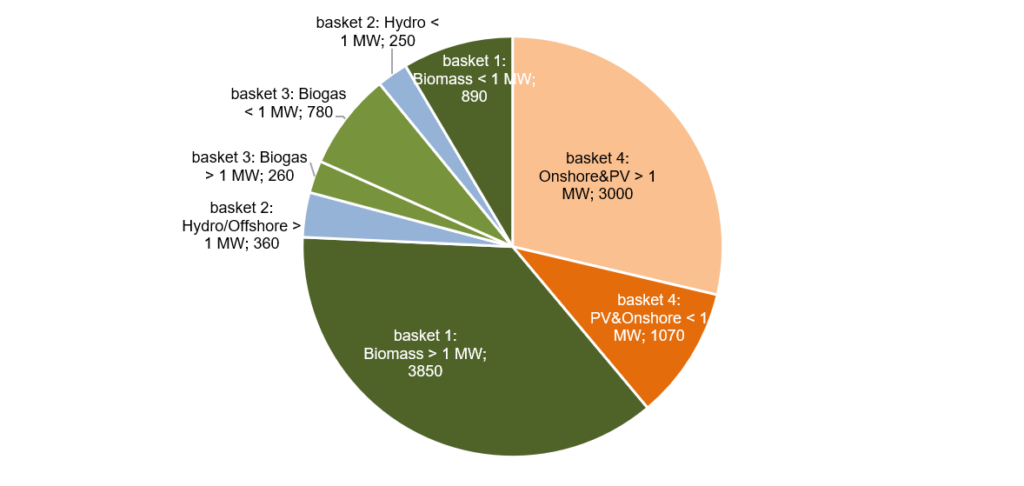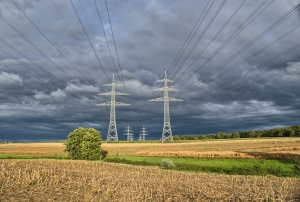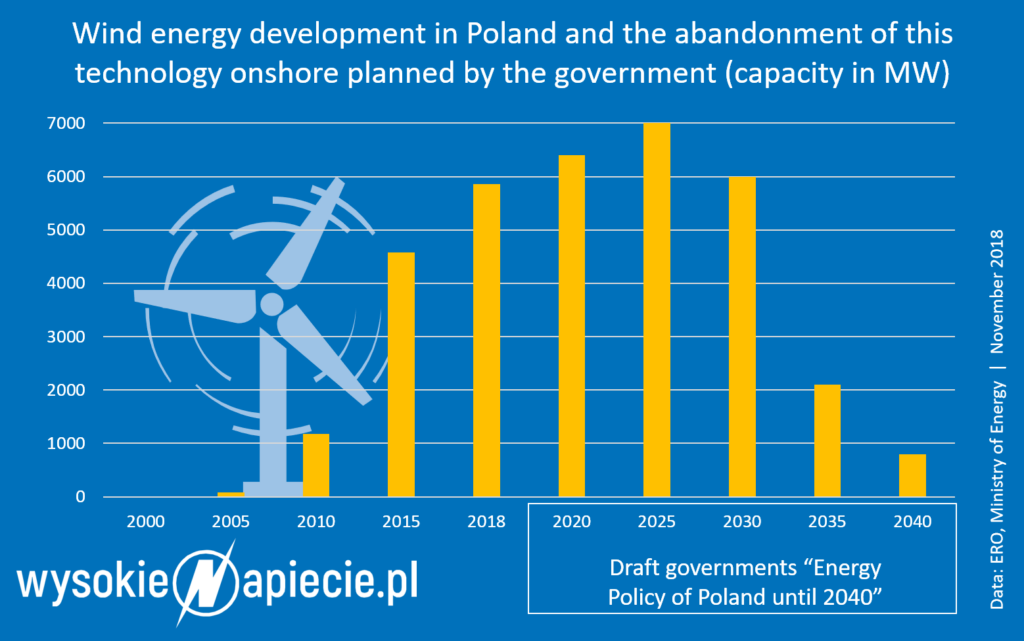Below we summarise key changes proposed in the Draft Act. The Draft Act aims at extending the term of grid connection agreements entered into before 4 May 2015, removing Polish Power exchange obligation and provides for certain positive changes in the auctioning system. On the other hand, the Draft Act amends the substitution fee formula in unfavourable manner for the RES producers.
- Prolongation of the grid connection agreements executed before the RES Act’s entry into force
- Under the RES Act the deadline for the first energy off-take shall be set in grid connection agreements executed before the RES Act’s entry into force (i.e. before 4 May 2015) and shall fall not later than on (i) 4 May 2019 for the onshore wind farms and (ii) 4 May 2021 for the offshore wind farms.
- The Draft Act, the deadline for the first energy off-take shall fall on between 1 January 2020 and 31 January 2020 (in relation to grid connection agreements executed before 4 May 2015). It seems that the intention of the Draft Act was not to affect the off-take date for the offshore wind farms; however, this should be clarified during further legislative process.
- The operator of the electricity grid is obliged to introduce an appropriate amendment to the grid connection agreement at the request of the energy producer. In case of refusal to update the timetable by the operator, the electricity producer may submit a request for the settlement of the dispute to the President of the Energy Regulatory Office, who, as a competent authority, has 30 days to issue a decision in this respect.
- The Draft Act does not change the general rules applicable to the grid connection agreements concluded after 3 May 2015 as set out in the Energy Law (i.e. 10-years for the offshore wind farms and 4-years for other RES installations).
- Removal of the Polish Power exchange obligation
- Under the RES Act, producer, who produces electricity in the RES installation until 31 December 2020 may only sell that electricity on the Polish Power Exchange or on the market organised by operator of the regulated market on the territory of Poland.
- This obligation is ambiguous as it is unclear whether it applies only to producers who benefit from the RES support system or all producers of the electricity in the RES installations. To ensure more certainty, the Draft Act simply proposes to remove it altogether.
- Please note that the general 100% exchange obligation exists under the Energy Law, but there are few exceptions in this regard, including the electricity produced from RES in RES installation.
- Changes in the auctioning system
- Currently, the winner of the auction has a right to cover the negative balance (between the between the market value of the electricity sold and its value presented in the offer issued by the given producer) for 15 years following the first sale of electricity covered by the support system. Although the right now expires on 31 December 2035 at the latest, the Draft Act extends it until 30 June 2039.
- The Draft Act also changes the time limit for the first sale of the electricity from 36 months to 42 months following the day of auction closing. The time limit does not apply to the PV plants (still 18 months), onshore wind farms (still 30 months) and offshore wind farms (still 72 months).
- Under the RES Act, the electricity may be covered by the auction system if the RES installation’s components are not older than 36 months at the day of the first generation of the electricity with exception for the PV plants (18 months), onshore wind farms (24 months) and offshore wind farms (72 months). The Draft Act stipulates that the components may not be older than 42 months, with no impact on PV plants, onshore and offshore wind farms.
- Pursuant to the Draft Act, it will not be required to attach the environmental decision to the application for the certificate on admission to the auction except for the offshore winds farms. Since the environmental decision is attached to the application for the building permit, there is no need for the re-examination of that decision by the President of the Energy Regulatory Office. The exception results from fact that the building permit is not required as an attachment to the application for the admission certificate for offshore wind farm projects.
- The Draft Act includes a provision allowing for the one-time revision of the offer which won the auction. Such revision can relate to:
- the date of commencement of the support period, however, the date for the first sale of the electricity may not be extended further and the support period may not last longer than end of June 2039, and the total quantity of the electricity indicated in the offer may not be changed; or
- the installed capacity of the RES installation, however, such revision may not affect the division into the RES installations with the installed capacity exceeding 1 MW and the RES installations with the installed capacity up to 1 MW (for which the separate auctions are carried out).
- Moreover, the Draft Act provides for the inclusion of the new provision to the Energy Law stating that the licence for the production of the energy in the RES installation may be issued for the first time for given installation only if this installation’s components will not be older than 48 months at the day of the first energy production.
- Change of the substitution fee formula
- The Draft Act also amends the substitution fee (Polish: opłata zastępcza) formula set out in the RES Act. Substitution fee is a payment made in case of failure to fulfil the requirement of an obligatory quantitative share of the electricity produced in the RES installations in the total amount of electricity purchased and consumed by the industrial customer or the electricity produced by the energy company.
- One of the elements included in the formula for the calculation of the substitution fee is the so called “Ozjo” factor. In its present wording of the RES Act, “Ozjo” is defined as the unit substitution fee of 125% of the average price of green certificates which is published by the Polish Power Exchange (Towarowa Giełda Energetyczna S.A.), which cannot be more than PLN 300.03 for 1 MWh. In the Draft Act, the “Ozjo” is defined as the unit substitution fee constituting the difference between 85% of the average of reference prices for all technologies applicable in 2018 weighted by the installed capacity of these technologies as at 30 June 2016 and the average annual sales price of the electricity on the competitive market in the previous year, as announced by the President of the Energy Regulatory Office.
- The Draft Act proposes to introduce those changes due to a situation that occurred in 2018 when both the price of the electricity and the price of green certificates increased, which could lead in future to excessive over-support for renewable energy sources and generate high system costs, subsequently passed on to the recipients of the energy. The government’s solution shall lead to a situation that the increase in the price of electricity on a competitive market will result in a corresponding adjustment of the substitution fee (its reduction), which may allow to avoid excessive support for producers in existing renewable energy units and reduce the burden on recipients of the energy related to the green certificates’ system costs.
- Interim provisions
- The interim provisions of the Draft Act are very important for RES support in 2019 and 2020.
- First, the interim provisions cap the maximum amount of the electricity, which may be sold at the auction in 2019. Without these provisions, it would not be possible to carry out auction this year. Auction in 2019 may result in development of new RES generation units with total capacity of 3,414 GW (with major share of onshore wind farms and PV plants). Below we present key figures regarding the auction in 2019:
- the maximum value of energy to be sold (in 2019) in the basket for PV plants and onshore windfarms with the capacity below 1 MW is 11,445,000 MWh with its value amounting to PLN 4,213,650,000 (in 2018, it was 16,065,000 MWh with its value amounting to PLN 6,243,300,000);
- the maximum value of energy to be sold (in 2019) in the basket for PV plants and onshore windfarms with the capacity above 1 MW is 91,470,000 MWh with its value amounting to PLN 26,164,500,000 (in 2018, it was 45,000,000 MWh with its value amounting to PLN 15,750,000,000);
- the maximum value of energy to be sold (in 2019) in the basket for installations using biomass with the capacity above 1 MW is 14,910,000 MWh with its value amounting to PLN 5,577,600,000 (in 2018, it was 57,699,309 MWh with its value amounting to PLN 24,929,301,412);
- the maximum value of energy to be sold (in 2019) in the basket for installations using agricultural biogas with the capacity above 1 MW is 1,170,000 MWh with its value amounting to PLN 678,600,000 (in 2018, it was 3,510,000 MWh with its value amounting to PLN 1,930,500,000).The above information demonstrates that auction in 2019 shall be dedicated mainly for onshore wind farms and large PV plants. Interestingly, the government set a higher cap of energy volume allocated for sale at auction in 2019 (145,748,400 MWh) than in 2018 (131,136,000 MWh) and at the same time a lower cap of public aid for this purpose (the difference amounts to app. PLN 17 billion).
- Second, the Draft Act stipulates that in 2020 the minimum share of the electricity from RES in total amount of sold electricity shall be 19,5% whereas the share of the agricultural biogas shall be 0,50%.
- Status of legislative works
- Analysed legislation: the draft Act amending the Renewable Energy Sources Act dated 20 February 2015 and certain other acts: the Act of 7 July 1994 – Building Law and the Act of 10 April 1997 – Energy Law.
- The Draft Act is at the stage of public consultations. The details of legislative works are available on the Government Legislation Centre’s website (Polish version only): https://legislacja.rcl.gov.pl/projekt/12321260/katalog/12571679#12571679.
- The Draft Act is planned to come into force on 1 April 2019 subject to the following:
- the amendment regarding the Energy Law shall enter into force on 1 January 2021; and
the amendment regarding substitution fee shall enter into force on 1 January of the year following the date of obtaining the consent of the European Commission for changes in existing state aid programme.












